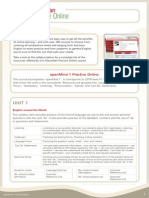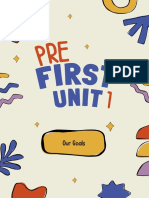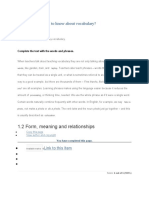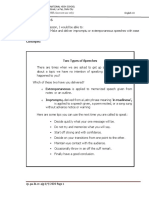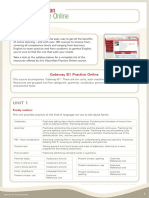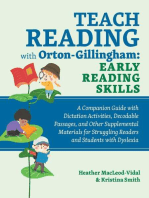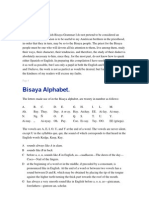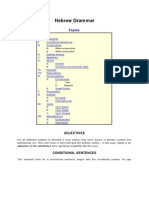OpenMind Essentials Practice Online
OpenMind Essentials Practice Online
Uploaded by
Ynafets No KurayamiCopyright:
Available Formats
OpenMind Essentials Practice Online
OpenMind Essentials Practice Online
Uploaded by
Ynafets No KurayamiCopyright
Available Formats
Share this document
Did you find this document useful?
Is this content inappropriate?
Copyright:
Available Formats
OpenMind Essentials Practice Online
OpenMind Essentials Practice Online
Uploaded by
Ynafets No KurayamiCopyright:
Available Formats
Macmillan Practice Online is the easy way to get all the benefits
of online learning – and with over 100 courses to choose from,
covering all competence levels and ranging from business
English to exam practice and from academic to general English,
you’re sure to find the one that suits your needs.
Take a look at the syllabus below for a complete list of the
resources offered by this Macmillan Practice Online course.
openMind Essentials Practice Online
This course accompanies 'openMind Essentials'. It corresponds to CEFR level Pre-A1. There are six
units that mirror the units in the coursebook. Resources are grouped into 'Functional Language',
'Grammar Focus', 'Vocabulary', 'Listening', 'Pronunciation' and 'Can Do' statements.
UNIT 1
High Five!
This syllabus item provides practice of the kind of language we use to greet people. It also provides
practice of the alphabet, numbers, the verb 'to be' and possessive adjectives.
Pronunciation Listening to consonants and choosing the ones you hear. Listening to vowels and
choosing the ones you hear. Practising numbers from 1 to 10 by listening to numbers
and choosing the ones you hear.
Grammar Focus Checking your knowledge of how to use the negative form of the verb 'be'. Checking
your knowledge of how to use the affirmative form of the present tense of the verb
'be'. Checking your knowledge of possessive adjectives.
'Can Do' statement I can give basic personal information. I can use 'be' in statements and negative
sentences. I can spell words and understand spelling. I can use and understand
numbers from 1 to 10. I can say and understand the letters of the alphabet. I can use
possessive adjectives. I can greet people and introduce myself.
Functional Language Practising contractions. Practising possessive adjectives.
Be : present simple Grammar Contractions of Language Exercise
negative Reference Unit the verb to be
Be : present simple Grammar Possessive adjectives Language Exercise
affirmative Reference Unit
The alphabet: consonants Pronunciation Activity
Possessive Grammar
adjectives: form Reference Unit The alphabet: vowels Pronunciation Activity
Numbers 1-10 Pronunciation Activity
Macmillan Practice Online is published by Macmillan English Campus
openMind Essentials Practice Online 1
UNIT 2
A World of Things
This syllabus item provides practice of the kind of language we use to describe rooms and say
where things are. It also provides practice of numbers and the interrogative form of 'to be'.
Vocabulary Looking at number clues and keying in the correct number word.
Grammar Focus Checking your knowledge of the zero article. Checking answers with the verb 'be'.
Checking your knowledge of the prepositions of place 'at', 'in', 'on' and 'under'.
Pronunciation Practising numbers from 11 to 101 by listening to numbers and choosing the ones you
hear.
'Can Do' statement I can use 'be' in questions. I can say where things are in a room. I can make and
understand a description of a room. I can use and understand numbers up to 101. I
can talk about prices.
Be : present simple Grammar Numbers 11-101 Pronunciation Activity
interrogative Reference Unit
Numbers 11 - 101 Vocabulary Activity
Prepositions of place 1 Grammar
Reference Unit
UNIT 3
International Relations
This syllabus item provides practice of the kind of language we use to speak about family
relationships and nationalities. It also provides practice of question words and the possessive 's
Functional Language Practising the possessive 's.
Pronunciation Identifying the main syllable stress in countries and nationalities within three pattern
groups. Identifying the main syllable stress in countries and nationalities.
'Can Do' statement I can ask information questions with 'be'. I can speak about people's nationalities. I
can use and understand the possessive with 's. I can understand and speak about
family relationships.
Vocabulary Practising words for family relationships. Choosing words to complete sentences
about relationships. Practising words for nationalities by reading sentences about
different countries and choosing the correct nationality.
Listening Listening to someone talking about her family.
Possessive 's Language Exercise Family relationships Vocabulary Activity
Mandy's family tree Listening Activity Countries and nationalities Vocabulary Activity
Word stress Pronunciation Activity Relationships Vocabulary Activity
Word stress Pronunciation Activity
Macmillan Practice Online is published by Macmillan English Campus
openMind Essentials Practice Online 2
UNIT 4
Two to Tango
This syllabus item provides practice of the kind of language we use to speak about ability, parts of
the body and the days of the week. It also provides practice of 'can/can't' and the definite article
Listening Listening to telephone conversations. Listening to a rap song about parts of the body
and keying in body parts to complete the lyrics.
Functional Language Practising definite and indefinite articles. Practising 'can' for ability by rearranging
sentences to make correct questions and short answers. Practising 'can' for ability
by reading sentences and choosing the correct form of 'can' to complete them.
Practising the modal verb 'can/can't' for ability by matching phrases with the correct
picture.
Vocabulary Practising the days of the week by dragging days to the correct sentences. Practising
the days of the week by matching each personality type with the correct day.
Grammar Focus Checking your knowledge of affirmative, negative and interrogative forms of 'can'.
'Can Do' statement I can use the definite article. I can speak about ability to do things. I can speak and
understand conversations about what people can do. I can speak about parts of the
body and days of the week.
What's different? Language Exercise Can for ability Language Exercise
Can you do this? Listening Activity Can for ability Language Exercise
Ability: can Grammar Days of the week Vocabulary Activity
Reference Unit
Days of the week Listening Activity
Language Exercise
Can for ability Days of the week Vocabulary Activity
Body Rap Listening Activity
UNIT 5
On the Job
This syllabus item provides practice of the kind of language we use to speak about jobs and telling
the time. It also provides practice of the present simple affirmative and interrogative.
Vocabulary Practising different ways of writing the time. Keying in the correct word to complete a
table showing verbs and related jobs. Reading descriptions of jobs and deciding which
job each person does.
Pronunciation Practising verb endings in the simple present.
Grammar Focus Checking how to form questions and short answers in the simple present. Checking
your knowledge of how to form the affirmative form of the simple present.
'Can Do' statement I can understand and use the present simple in affirmative statements and Yes/No
questions. I can understand and speak about jobs. I can understand and tell the time.
I can talk about places in a town.
Listening Listening and choosing the right job. Listening to six people talking about what jobs
they do.
Functional Language Practising the simple present. Practising the third person singular form of the simple
present. Practising making simple present questions in the third person singular.
Macmillan Practice Online is published by Macmillan English Campus
openMind Essentials Practice Online 3
Present simple: Grammar Simple present: Language Exercise
interrogative Reference Unit interrogative
Present simple: affirmative Grammar Jobs Listening Activity
Reference Unit
Jobs Listening Activity
Telling the time Vocabulary Activity
Jobs Vocabulary Activity
Simple present Language Exercise
Jobs Vocabulary Activity
Simple present Language Exercise
Simple present endings Pronunciation Activity
UNIT 6
An Apple a Day
This syllabus item provides practice of the kind of language we use to speak about daily routines
and meals. It also provides practice of the simple present for asking questions and frequency
adverbs.
Pronunciation Looking at the pictures and keying the correct meal word into sentences.
Vocabulary Practising clothes and colors. Looking at pictures of people doing daily activities and
choosing the correct words to complete the sentences. Practising words about food.
Functional Language Choosing the correct form of the simple present to complete sentences. Practising
the affirmative and negative forms of the simple present.
Listening Listening to five people talking about their morning activities and clicking on the
correct picture letter for each question. Listening to three short dialogs and matching
the food to the correct person. Listening to five short dialogs and matching them to
the correct person.
'Can Do' statement I can ask and understand information questions in the present simple. I can speak
about meals and food. I can use frequency adverbs. I can speak about daily routines. I
can name colors.
Grammar Focus Checking your knowledge of adverbs of frequency.
Adverbs of frequency: Grammar Routines Listening Activity
never to always Reference Unit
Meals Vocabulary Activity
What color is it? Vocabulary Activity
Daily activities Vocabulary Activity
Simple present: Language Exercise
affirmative and negative Food Listening Activity
Simple present Language Exercise Food Vocabulary Activity
Color Listening Activity
Macmillan Practice Online is published by Macmillan English Campus
openMind Essentials Practice Online 4
You might also like
- English Stress (Word Stress, Rules, Types, Degrees)Document11 pagesEnglish Stress (Word Stress, Rules, Types, Degrees)Jazmin Sanabria100% (5)
- Methodological Recommendations FOR Summative Assessment: (For Nazarbayev Intellectual Schools)Document33 pagesMethodological Recommendations FOR Summative Assessment: (For Nazarbayev Intellectual Schools)Дневник ОчкарикаNo ratings yet
- RS1 Jens Best Gift Ever Foundational Skills GuideDocument10 pagesRS1 Jens Best Gift Ever Foundational Skills GuideGeraldine AquinoNo ratings yet
- Find The Subject ComplementDocument2 pagesFind The Subject ComplementMatet Ingat100% (1)
- Lesson 1 - Post Lesson ReflectionDocument2 pagesLesson 1 - Post Lesson Reflectionapi-331597361100% (1)
- Sky High 1A Practice OnlineDocument8 pagesSky High 1A Practice OnlineErzio rios doranteNo ratings yet
- Mastermind 1 Practice OnlinexDocument9 pagesMastermind 1 Practice OnlinexGrecia Ugarte ArchondoNo ratings yet
- CEFR Level C1 Practice Online (British)Document17 pagesCEFR Level C1 Practice Online (British)Alejandro GarciaNo ratings yet
- Straightforward Elementary Practice OnlineDocument9 pagesStraightforward Elementary Practice OnlineS'anda IoNo ratings yet
- Openmind 2 Practice OnlineDocument9 pagesOpenmind 2 Practice Online5dqwrj7cjfNo ratings yet
- OpenMind 1 Practice OnlineDocument10 pagesOpenMind 1 Practice OnlineClauCamarenaNo ratings yet
- New Inspiration 3 Practice Online PDFDocument9 pagesNew Inspiration 3 Practice Online PDFМи ЛанаNo ratings yet
- Gateway B2 Practice Online PDFDocument9 pagesGateway B2 Practice Online PDFNuria GLNo ratings yet
- Gateway B2 Practice Online PDFDocument8 pagesGateway B2 Practice Online PDFAnonymous 4gdel2XNo ratings yet
- New American Inside Out Pre-Intermediate Practice OnlineDocument9 pagesNew American Inside Out Pre-Intermediate Practice Onlinefrutillin15No ratings yet
- EaSTE M-1 Kallurkot TeachersDocument10 pagesEaSTE M-1 Kallurkot TeachersMuzammil HasnainNo ratings yet
- Laser B1 Practice OnlineDocument14 pagesLaser B1 Practice OnlineBeatriz Perez LunaNo ratings yet
- New American Inside Out Upper Intermediate Practice OnlineDocument11 pagesNew American Inside Out Upper Intermediate Practice OnlineLizeth Rodriguez Rodriguez0% (1)
- OpenMind 3 Practice OnlineDocument9 pagesOpenMind 3 Practice OnlineBetoxic KinterockNo ratings yet
- Gateway B1 Practice Online PDFDocument9 pagesGateway B1 Practice Online PDFTrongTanNo ratings yet
- New Inside Out Upper Intermediate Practice OnlineDocument15 pagesNew Inside Out Upper Intermediate Practice OnlineVictor Andres Pretell Rodriguez0% (1)
- Gateway A2 Practice OnlineDocument10 pagesGateway A2 Practice Onlinecarosuarez92No ratings yet
- Speaking 1 - English I - F3Document2 pagesSpeaking 1 - English I - F3juan sebastian paterninaNo ratings yet
- Pre1st Newsletter Q1Document7 pagesPre1st Newsletter Q1Luisa Rivera100% (1)
- Conquering The Verb: Anything and Everything You Would Like To KnowDocument23 pagesConquering The Verb: Anything and Everything You Would Like To KnowMusesSMLNo ratings yet
- Vocabulary: Group 6: Nur Fatimah Nur Fuadzi YP Annisa Sarjuning Sih Ria HandayaniDocument4 pagesVocabulary: Group 6: Nur Fatimah Nur Fuadzi YP Annisa Sarjuning Sih Ria Handayanifuadzi yudhaNo ratings yet
- Monthly Planning - Placement (Domenica-Carlos)Document4 pagesMonthly Planning - Placement (Domenica-Carlos)Anthony ColibriNo ratings yet
- Assignment 1 - Final Submission - Amna ArbiDocument10 pagesAssignment 1 - Final Submission - Amna ArbiAmna ArbiNo ratings yet
- Teaching VocabularyDocument40 pagesTeaching VocabularySaima MunawarNo ratings yet
- English - BrochureDocument7 pagesEnglish - Brochurevasanthradevi geethaNo ratings yet
- Headway Phrasal Verbs and Idioms Upper IntermediateDocument96 pagesHeadway Phrasal Verbs and Idioms Upper Intermediateacar63100% (9)
- EFL Teaching Methods Tong HopDocument94 pagesEFL Teaching Methods Tong HopThien MaiNo ratings yet
- EaSTE Module 3Document23 pagesEaSTE Module 3Amal AroubNo ratings yet
- Oup7 CatedraNRC7619Document5 pagesOup7 CatedraNRC7619Alejandro MoncayoNo ratings yet
- TP2 Lesson Plan - ACE 2023Document8 pagesTP2 Lesson Plan - ACE 2023Lana IDNo ratings yet
- Modulo3unit3 3725689Document5 pagesModulo3unit3 3725689estefaniNo ratings yet
- Foundation Class 1: Mureed Hussain JasraDocument48 pagesFoundation Class 1: Mureed Hussain JasraMuhammad SaeedNo ratings yet
- Module 1-Lesson 2-Teaching VocabularyDocument25 pagesModule 1-Lesson 2-Teaching VocabularyxuandaoNo ratings yet
- Pancit CantonDocument7 pagesPancit Cantonjohnjoshua cambalizaNo ratings yet
- Workbook IntermediateDocument97 pagesWorkbook IntermediateAndrea Velasco OrtizNo ratings yet
- Speaking Skill:: INSTRUCTIONS: Three Questions Will Be Asked (The Teacher Chooses Any Question SoDocument4 pagesSpeaking Skill:: INSTRUCTIONS: Three Questions Will Be Asked (The Teacher Chooses Any Question SomaryNo ratings yet
- To The Student: Level 1Document5 pagesTo The Student: Level 1Daniela Gómez AriasNo ratings yet
- Speaking Skill:: INSTRUCTIONS: Three Questions Will Be Asked (The Teacher Chooses Any Question SoDocument4 pagesSpeaking Skill:: INSTRUCTIONS: Three Questions Will Be Asked (The Teacher Chooses Any Question SomaryNo ratings yet
- Beginners LEVEL 1Document2 pagesBeginners LEVEL 1Ronald AranhaNo ratings yet
- New DLL English-2 q1 w5-1Document8 pagesNew DLL English-2 q1 w5-1RASALYN VALOISNo ratings yet
- Verbs and Modals - Study NotesDocument16 pagesVerbs and Modals - Study NotesAaditya KamatNo ratings yet
- AAR Blending ProcedureDocument3 pagesAAR Blending ProcedurejoehodohNo ratings yet
- Parts of SpeechDocument6 pagesParts of SpeechRayene MedabisNo ratings yet
- Phnology 5658 Final Lesson PlanDocument5 pagesPhnology 5658 Final Lesson PlanIshrat nazNo ratings yet
- English 1 - Q4 - W5 DLLDocument6 pagesEnglish 1 - Q4 - W5 DLLJanes Soria Abarientos ArquinezNo ratings yet
- DLL - EN6 1st Quarter Week 7 Day 2Document3 pagesDLL - EN6 1st Quarter Week 7 Day 2Jeclyn D. Filipinas100% (3)
- English Indonesia ComparisonDocument26 pagesEnglish Indonesia Comparisonhanahanifah290302No ratings yet
- Inset Strategiesinpromotingnumeracyandliteracy 210329092926Document23 pagesInset Strategiesinpromotingnumeracyandliteracy 210329092926Lovely Locsin VillarNo ratings yet
- Student's NameDocument17 pagesStudent's NameCivilNo ratings yet
- Cartilla PronunciaciónDocument3 pagesCartilla PronunciaciónJhon Jairo Fagua MuñozNo ratings yet
- For INHS Classroom Use Only) : Iloilo National High School Luna Street, La Paz, Iloilo City English 10Document3 pagesFor INHS Classroom Use Only) : Iloilo National High School Luna Street, La Paz, Iloilo City English 10Mikaela Julianne EradaNo ratings yet
- Phonics HandbookDocument29 pagesPhonics Handbookineveen4No ratings yet
- Level 1 - Course Overview Super Minds StarterDocument4 pagesLevel 1 - Course Overview Super Minds StarterMIS VichetNo ratings yet
- AssignmentDocument4 pagesAssignmentsupakit0920No ratings yet
- Gateway B1 PracticeDocument9 pagesGateway B1 PracticeasNo ratings yet
- Differentiated Spelling Practice, Grade 2: Games and Activities for Any Spelling ListFrom EverandDifferentiated Spelling Practice, Grade 2: Games and Activities for Any Spelling ListNo ratings yet
- Teach Reading with Orton-Gillingham: Early Reading Skills: A Companion Guide with Dictation Activities, Decodable Passages, and Other Supplemental Materials for Struggling Readers and Students with DyslexiaFrom EverandTeach Reading with Orton-Gillingham: Early Reading Skills: A Companion Guide with Dictation Activities, Decodable Passages, and Other Supplemental Materials for Struggling Readers and Students with DyslexiaNo ratings yet
- Day 1 GrammarDocument6 pagesDay 1 GrammarJames DSNo ratings yet
- Compounding 1Document2 pagesCompounding 1shaheerNo ratings yet
- Ordinary Subject in A Simple Catenative Construction With To-Infinitivals Verb: AskDocument10 pagesOrdinary Subject in A Simple Catenative Construction With To-Infinitivals Verb: AskJelena SimsNo ratings yet
- LP For Participle (Day 1)Document6 pagesLP For Participle (Day 1)Charity Anne Camille PenalozaNo ratings yet
- 10 Simple SentencesDocument4 pages10 Simple SentencesImam YudhoNo ratings yet
- (EN6G-Ih-3.9) : Use Courteous / Polite ExpressionsDocument6 pages(EN6G-Ih-3.9) : Use Courteous / Polite ExpressionsRussel Beth Pasadas BauyaNo ratings yet
- Pronouns and ClausesDocument14 pagesPronouns and ClausesHenyTwin'sNo ratings yet
- Bisaya Language GramaticalDocument128 pagesBisaya Language GramaticalAkbar Khan100% (3)
- Clickworker AnswersDocument12 pagesClickworker AnswersAndreea Diana100% (1)
- Stem - Written Close Analysis FormatDocument5 pagesStem - Written Close Analysis FormatJealf Zenia Laborada CastroNo ratings yet
- Bound and Free MorphemesDocument15 pagesBound and Free MorphemesEph FurNo ratings yet
- VerbDocument3 pagesVerbahmed100% (1)
- Academic Writing ChecklistDocument2 pagesAcademic Writing ChecklistAndrea BigoniNo ratings yet
- Topnotch Fundamental Second EditionDocument2 pagesTopnotch Fundamental Second EditionSarah Kennedy50% (2)
- The Word MeaningDocument81 pagesThe Word MeaningThạch Hoàng SơnNo ratings yet
- The Grammar of Numbers - Grammar - Peck's English Pointers - TERMIUM Plus® - Translation Bureau PDFDocument3 pagesThe Grammar of Numbers - Grammar - Peck's English Pointers - TERMIUM Plus® - Translation Bureau PDFSharon KaurNo ratings yet
- 8 - Consumerism - Passive VoiceDocument1 page8 - Consumerism - Passive VoiceJoão DiasNo ratings yet
- Makalah Putri B.inggDocument10 pagesMakalah Putri B.inggSitorus PaneNo ratings yet
- What Is ConcordDocument6 pagesWhat Is ConcordAjisafe Jerry T-moneyNo ratings yet
- Position of Adverbs WorksheetsDocument7 pagesPosition of Adverbs Worksheetstarun mathurNo ratings yet
- Parts of Speech Noun, Pronoun, AdjectiveDocument41 pagesParts of Speech Noun, Pronoun, AdjectiveZeerik RazaNo ratings yet
- Hebrew GrammarDocument12 pagesHebrew GrammarUmair Tariq100% (2)
- Etymologischer Ursprung Der RedupliziertDocument21 pagesEtymologischer Ursprung Der RedupliziertOctave Eugene De LazzeroNo ratings yet
- PrepositionDocument11 pagesPrepositionWong Jia MingNo ratings yet
- Parts SpeechDocument2 pagesParts SpeechTeddy Agung SaputraNo ratings yet
- Lesson F I V e Across TimeDocument18 pagesLesson F I V e Across TimeemmvalineNo ratings yet
- Conflicting Constraints An Introduction To Optimality TheoryDocument12 pagesConflicting Constraints An Introduction To Optimality TheoryIntzarEltlNo ratings yet











